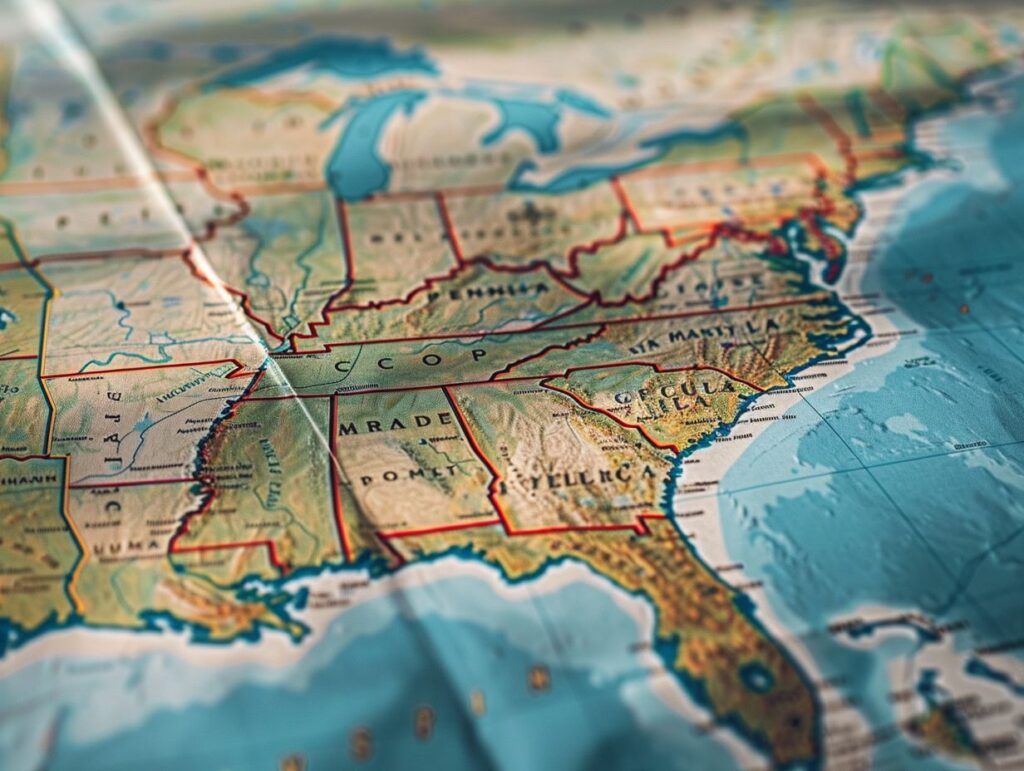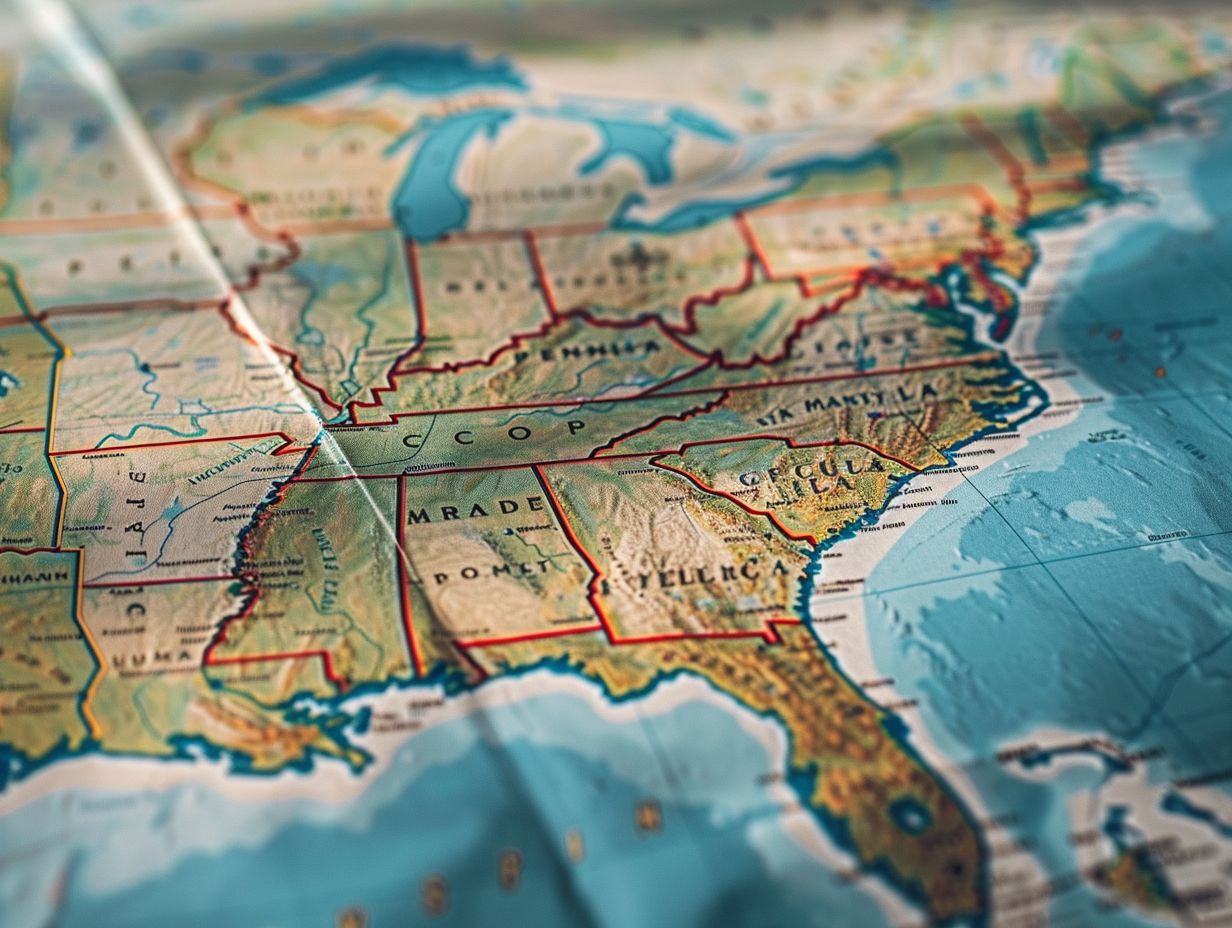Florida, like many other border states, faces a range of complex challenges stemming from its proximity to other countries. From immigration and drug trafficking to human trafficking and smuggling, these issues have far-reaching implications for the state.
In this article, we will explore how these border issues impact Florida economically, socially, and environmentally. We will examine the efforts made by the federal, state, and local governments to address these issues and discuss what more can be done to strengthen border security, address root causes, and promote collaboration and cooperation.
Stay tuned to learn more about the major border issues affecting Florida and the steps being taken to address them.
Key Takeaways:
- Immigration, drug trafficking, human trafficking, and smuggling are the major border issues affecting Florida.
- These issues have significant economic, social, and environmental impacts on the state.
- Efforts by the federal, state, and local governments are being made, but more can be done through strengthening border security, addressing root causes, and promoting collaboration and cooperation.
What Are the Major Border Issues Affecting Florida?
Florida encounters various significant border issues, such as immigration challenges, drug trafficking, human trafficking, and smuggling, that have notable effects on the state’s security and socio-economic conditions. These issues are primarily fueled by the substantial influx of immigrants coming into the United States through the Southern border and other entry points, requiring comprehensive strategies and resources to handle migration efficiently.
1. Immigration
Immigration continues to be a significant border issue in Florida, characterized by high levels of encounters at the Southern border and a sizable influx of asylum seekers into the state.
These challenges have strained Florida’s resources and infrastructure, leading to ongoing debates on the most effective ways to manage the surge. The state’s social services, healthcare facilities, and educational systems have experienced heightened pressure due to the increasing population of newcomers. There has also been a rise in the demand for legal assistance and support services for asylum seekers.
Given the complexity of these issues, policymakers and community stakeholders are working to strike a balance between humanitarian aid and border security concerns.
2. Drug Trafficking
Drug trafficking is a significant border issue affecting Florida, with illegal substances being smuggled through the Southern border and monitored by the Department of Homeland Security (DHS).
This illicit activity involves the trafficking of a variety of drugs, including cocaine, heroin, methamphetamine, and marijuana. These substances are often transported using different methods, such as hidden compartments in vehicles, commercial trucks, or even through underground tunnels.
In response to this ongoing challenge, the Department of Homeland Security, in collaboration with other law enforcement agencies, has implemented extensive measures to combat drug trafficking along the border. These efforts include increased patrols, intelligence gathering, and cooperation with international partners to disrupt and dismantle drug smuggling networks.
3. Human Trafficking
Human trafficking presents a significant threat to the safety and well-being of immigrants in Florida, with the Department of Homeland Security (DHS) working diligently to prevent such activities.
This challenging issue affects vulnerable populations, including undocumented migrants, women, and children who are victims of labor or sex trafficking. Recognizing the importance of addressing this injustice, various organizations collaborate with DHS to raise awareness, offer support services, and implement preventive measures.
Through outreach programs, training sessions, and policy initiatives, efforts are undertaken to give the power to individuals, strengthen law enforcement capabilities, and disrupt trafficking networks. Collectively, these proactive measures are aimed at protecting communities and ensuring the safety of those susceptible to exploitation.
4. Smuggling
Smuggling is a prevalent issue at Florida’s borders, with U.S. Customs and Border Protection working to intercept illegal goods and contraband entering the state.
Various forms of smuggling, such as human trafficking, drug trafficking, and wildlife trafficking, present significant challenges for border security. The types of contraband typically involved include drugs like cocaine and marijuana, counterfeit goods, and endangered wildlife products.
To address these illegal activities, U.S. Customs and Border Protection employs a multi-faceted approach that includes advanced technology, K-9 units, and intelligence gathering. These enforcement actions are crucial for safeguarding the nation’s borders and ensuring the safety of its citizens.
How Do These Border Issues Affect Florida?
The border issues impacting Florida have wide-ranging consequences on the state’s economy, social structure, and environment, requiring a multi-faceted approach to effectively manage and lessen their impact.
1. Economic Impact
The economic impact of border issues in Florida is significant, putting a strain on state resources and affecting various sectors due to the influx of migrants. This strain is evident in the increased costs associated with providing services such as healthcare, education, and social assistance to immigrants. These expenses create a burden on the state budget, diverting funds from other essential programs and initiatives.
The influx of migrants can disrupt the labor market, causing wage fluctuations and competition for jobs. The broader economic implications extend to sectors like agriculture and tourism, where workforce availability and consumer spending patterns may be influenced by border issues. Consequently, policymakers are faced with the challenge of balancing humanitarian concerns with the economic realities of managing border-related costs.
2. Social Impact
The social impact of border issues in Florida is significant, affecting community dynamics, public services, and the integration of asylum seekers and immigrants.
As these border challenges persist, communities in Florida experience growing pressure on public services such as healthcare, education, and housing, as they work to meet the needs of asylum seekers and immigrants. This strain often results in tensions within the community, impacting relationships between residents and newcomers.
Effectively addressing these challenges requires a focus on promoting positive community relations, offering sufficient support for the integration of asylum seekers and immigrants, and ensuring that public services can handle the increasing demand without sacrificing quality.
3. Environmental Impact
The environmental impact of border issues in Florida includes degradation of natural habitats and increased waste and pollution due to migration activities.
The destruction of natural habitats along the border regions not only displaces wildlife but also disrupts the delicate balance of the ecosystem. The influx of people and goods across the border often leads to a surge in waste generation and pollution, further straining the environment.
These activities leave a substantial environmental footprint, with long-lasting repercussions on the local flora and fauna. Efforts to manage and mitigate these environmental impacts are crucial to preserving the biodiversity and ecological health of the border areas in Florida.
What Steps Have Been Taken to Address These Issues?
Multiple measures have been implemented at federal, state, and local levels to tackle the border issues impacting Florida, such as new legislation, initiatives by the Department of Homeland Security, executive orders, and actions taken by Congress to handle and alleviate these challenges efficiently.
1. Federal Government Efforts
Various efforts have been implemented by the federal government to address border issues in Florida, including actions by the Department of Homeland Security (DHS), executive orders, and legislative measures passed by Congress.
DHS plays a critical role in monitoring and securing the borders, using technology and personnel to enhance surveillance and control. Executive orders have directed the allocation of resources towards border security, fostering collaboration between federal agencies and state authorities. Congress has passed legislation to fund border infrastructure projects, improve immigration processing, and enhance cross-border law enforcement partnerships.
These collective efforts are aimed at strengthening border defenses, streamlining immigration processes, and ensuring national security along the Florida border.
2. State Government Efforts
The state government of Florida, under the leadership of Governor Ron DeSantis, has made significant efforts during legislative sessions to address border issues, including the implementation of anti-immigrant laws.
These legislative actions have evoked a range of responses among Floridians, with supporters emphasizing the necessity of enhanced border security, while critics argue that such laws could have adverse effects on immigrant communities.
Governor DeSantis, recognized for his firm stance on immigration, has openly stressed the importance of maintaining state sovereignty and safeguarding citizens’ interests. The recent policies demonstrate the administration’s dedication to enforcing stricter measures and aligning state laws with federal immigration policies.
3. Local Government Efforts
Local governments in Florida have been proactive in addressing border issues by allocating resources to manage challenges and ensure border security. These initiatives include increased funding for border patrol agents, upgrading surveillance technology along the borders, and implementing community outreach programs to enhance awareness and cooperation.
Through collaborative efforts with state and federal agencies such as the Department of Homeland Security and Customs and Border Protection, local governments have been able to bolster their border control strategies and effectively address cross-border issues. By sharing resources, information, and expertise, these partnerships have strengthened the overall security measures in the region.
What More Can Be Done to Address These Issues?
- Enhancing border security
- Tackling the underlying reasons for migration
- Promoting collaboration among stakeholders
1. Strengthening Border Security
Enhancing border security in Florida is considered essential, necessitating support from Congress and the implementation of measures like the Lawful Pathways rule.
Plus this, other strategies to strengthen border security in Florida may involve utilizing technological advancements such as drones, sensors, and biometric identification systems. These technological tools can enhance surveillance capabilities and assist in efficiently identifying unauthorized border crossings.
Implementing strict regulatory measures, like the Lawful Pathways rule, can help reinforce legal entry points and discourage unlawful activities along the borders. By integrating legislative measures, technological innovations, and regulatory frameworks, Florida can establish a comprehensive strategy to improve border security and protect its communities.
2. Addressing Root Causes
It is crucial to address the root causes of migration from countries in the Western Hemisphere, such as Colombia, Costa Rica, Ecuador, and Guatemala, to alleviate the border issues affecting Florida. Factors like economic instability, gang violence, and environmental disasters often drive individuals to seek better opportunities elsewhere.
By understanding and addressing these underlying issues, sustainable solutions can be developed to prevent involuntary migration. Investing in education, job creation, and conflict resolution programs within these nations can help break the cycle of migration.
Establishing regional partnerships and promoting fair trade practices may contribute to long-term stability and economic growth in these countries, ultimately reducing the need for their citizens to migrate for a better life.
3. Collaboration and Cooperation
Collaboration and cooperation among agencies like U.S. Customs and Border Protection, U.S. Citizenship and Immigration Services, and international partners such as Mexico are important for effectively addressing Florida’s border issues.
Through joint efforts, critical information sharing and coordinated operations are made possible, enabling a seamless response to security threats and organized crime activities that transcend borders.
By working together, these agencies and countries can leverage their respective resources and expertise to enhance border surveillance, intelligence gathering, and enforcement capabilities. This collective approach not only strengthens national security but also fosters trust and diplomacy between nations, paving the way for a more secure and interconnected global community.
Frequently Asked Questions
What are the most pressing border issues impacting Florida?
The main border issues impacting Florida include illegal immigration, drug trafficking, human trafficking, and smuggling of weapons and contraband.
How does illegal immigration affect Florida’s economy?
Illegal immigration can have both positive and negative effects on Florida’s economy. On one hand, undocumented immigrants contribute to the workforce and pay taxes. On the other hand, they may also strain public services and resources.
What steps can Florida take to address these border issues?
Florida can increase funding for border security measures, such as hiring more border patrol agents and investing in technology like surveillance drones. The state can also work with federal agencies to crack down on illegal activities and strengthen immigration policies.
How does drug trafficking impact Florida?
Drug trafficking is a major issue for Florida as the state serves as a key entry point for drugs coming from South and Central America. This not only fuels the opioid epidemic but also contributes to violence and crime in communities.
What are the potential consequences of not addressing these border issues?
If border issues in Florida are left unchecked, it could lead to an increase in crime rates, strain on public resources, and damage to the state’s economy. It could also have a negative impact on national security.
How can individuals and communities play a role in addressing border issues impacting Florida?
Individuals and communities can stay informed about border issues and support measures to strengthen border security. They can also report any suspicious activities or illegal crossings to authorities. Additionally, supporting organizations that assist immigrants and victims of trafficking can also make a positive impact.



























Rate this article:
Average rating 0 / 5. Vote count: 0
No votes so far! Be the first to rate this post.
No Comments yet!